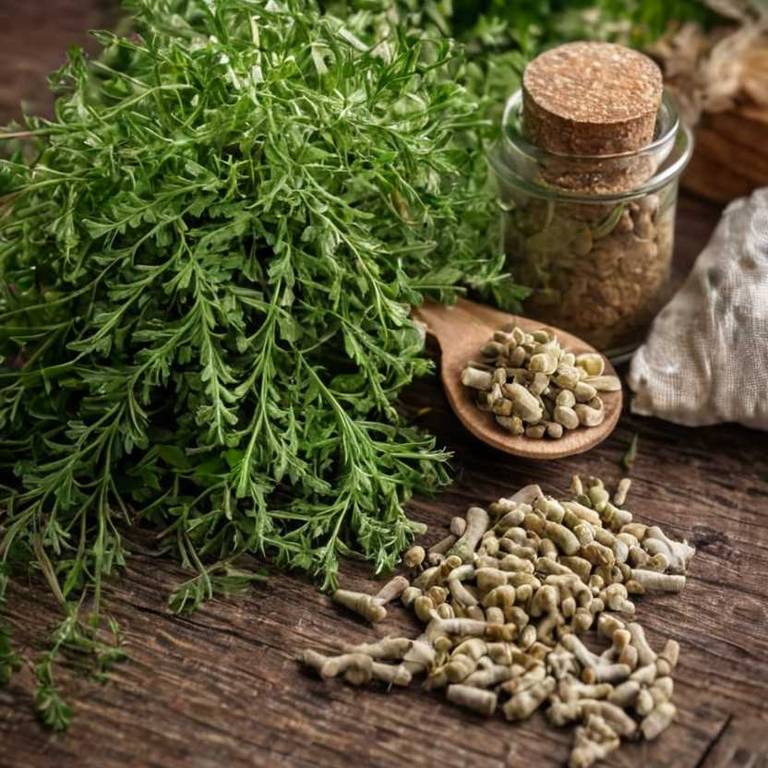By Leen Randell
Updated: Jul 05, 2024
What Are The Medicinal Properties Of Petroselinum Crispum (Parsley)?

Petroselinum crispum, also known as parsley, has health benefits such as reducing inflammation and improving digestive function.
The herb contains medicinal constituents like apigenin, luteolin, and beta-carophyllene, which contribute to its therapeutic properties. Medicinal preparations of parsley include teas, tinctures, and fresh juice, often used to treat colds, coughs, and gastrointestinal issues. Side effects of parsley consumption may include allergic reactions and interactions with certain medications.
Precautions include pregnant women avoiding excessive consumption and individuals with bleeding disorders using caution when using parsley.
This article explains the health benefits, active constituents, medicinal preparations, possible side effects, and precautions related to Petroselinum crispum.
- What are the health benefits of Petroselinum crispum?
- What are the active constituents of Petroselinum crispum?
- What are the medicinal preparations of Petroselinum crispum?
- What are the possible side effect of using Petroselinum crispum improperly?
- What precautions to take when using Petroselinum crispum medicinally?
What are the health benefits of Petroselinum crispum?
Petroselinum crispum, also known as parsley, has health benefits such as reducing inflammation and improving digestion due to its high content of antioxidants and flavonoids.
It is also a rich source of vitamins C and K, which play a crucial role in boosting the immune system and preventing blood clots.
Parsley has been traditionally used to aid in reducing menstrual cramps and promoting iron absorption in the body.
Here's a detailed article about the 10 health benefits of Petroselinum crispum.
What are the active constituents of Petroselinum crispum?
Petroselinum crispum, also known as parsley, has active constituents such as apigenin, beta-carotene, and myristicin.
Apigenin is a flavonoid with antioxidant and anti-inflammatory properties. Beta-carotene is a precursor to vitamin A, which is essential for healthy skin and mucous membranes. Myristicin has been shown to have potential medicinal benefits, including antiviral and anti-cancer properties.
These constituents contribute to parsley's traditional uses in herbal medicine.
Here's a detailed article about the 10 active constituents of Petroselinum crispum.
What are the medicinal preparations of Petroselinum crispum?
Petroselinum crispum, also known as parsley, has medicinal preparations such as infusions, decoctions, and tinctures.
The leaves are rich in volatile oils, flavonoids, and beta-carotene, which contribute to their therapeutic properties. These preparations are used to alleviate digestive issues, such as indigestion and bloating, and to support healthy blood pressure and circulation.
Additionally, parsley is used as a carminative to soothe flatulence and relieve menstrual cramps.
Here's a detailed article about the 10 medicinal preparations of Petroselinum crispum.
What are the possible side effect of using Petroselinum crispum improperly?
Improper use of Petroselinum crispum, also known as parsley, increases the chances of experiencing side effects such as excessive bleeding due to its high vitamin K content, interaction with blood thinners, and allergic reactions like hives and itching in some individuals.
Consuming large amounts can also cause digestive issues like nausea, vomiting, and diarrhea.
Women may experience hormonal imbalances if they consume excessive parsley.
Here's a detailed article about the 10 most common side effects of Petroselinum crispum.
What precautions to take when using Petroselinum crispum medicinally?
Before using Petroselinum crispum, also known as parsley, for medicinal purposes, you must take precautions such as avoiding excessive consumption, as it may interact with blood thinners and medications.
Additionally, parsley can exacerbate certain health conditions, including kidney disease, low blood pressure, and bleeding disorders.
Pregnant or breastfeeding women should also consult a healthcare professional before using parsley medicinally.
Here's a detailed article about 10 precautions to take when using Petroselinum crispum.